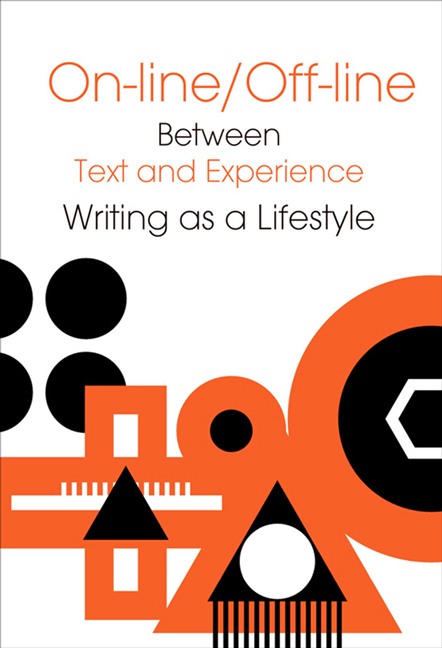Book contents
- Frontmatter
- Contents
- Editors’ Introduction
- ON-LINE/ OFF-LINE
- LITERATURE AND CONVERGENCE
- Poetics in the Age of Convergence
- Convergence and Communication: Genre Analysis of the websites of Polish Writers
- Towards a Generic Analysis of the Microblog (Based on a Study of Twitter)
- How Does the Hybrid Work of Art Exist?
- Liberature in Relation to the Reconfiguration of Aisthesis
- Literature in/of the City – Introductory Comments
- Literary Studies, History and Popular Culture – the Spaces of Convergence
- Afterpop: the Almost Perfect Convergence
- Transcultural Convergence? Polish Poets and Artists and the Oriental Verbo-visuality
- From an E-narrative Poem towards an Interactive Work of Art. Media Convergence Illustrated with DOWN by Zenon Fajfer and The Surprising Spiral by Ken Feingold
Liberature in Relation to the Reconfiguration of Aisthesis
from LITERATURE AND CONVERGENCE
Published online by Cambridge University Press: 12 January 2018
- Frontmatter
- Contents
- Editors’ Introduction
- ON-LINE/ OFF-LINE
- LITERATURE AND CONVERGENCE
- Poetics in the Age of Convergence
- Convergence and Communication: Genre Analysis of the websites of Polish Writers
- Towards a Generic Analysis of the Microblog (Based on a Study of Twitter)
- How Does the Hybrid Work of Art Exist?
- Liberature in Relation to the Reconfiguration of Aisthesis
- Literature in/of the City – Introductory Comments
- Literary Studies, History and Popular Culture – the Spaces of Convergence
- Afterpop: the Almost Perfect Convergence
- Transcultural Convergence? Polish Poets and Artists and the Oriental Verbo-visuality
- From an E-narrative Poem towards an Interactive Work of Art. Media Convergence Illustrated with DOWN by Zenon Fajfer and The Surprising Spiral by Ken Feingold
Summary
Abstract
This article proposes to inspect the phenomenon of liberature from the perspective of the reconfiguration of aisthesis, as described by Wolfgang Welsch. In the German researcher's approach, this consists in questioning the primacy of vision in favour of other senses, and is, first of all, an effect of the dominance of the media. However, in a broader approach towards the reasons of transformations, aisthesis must be looked for in phenomena that are summarised in the formula of “new aesthetics”, as proposed by Arnold Berleant. One of the significant features of this concept is the constant expansion of the area of art and the appearance of forms that stimulate the audience's experience, requiring the activation of new sensory receptors. Without a doubt, liberature is one of those forms of art that re-quires interactivity and a special involvement. Being a unique example of the co-existence of various types of messages (verbal, iconic and material), liberature requires a polysenso-ry perception. This, in turn, can be a source of aesthetic satisfaction, but also a reason for an impoverishment of the aesthetic experience spanning between aisthesis and anaisthesis.
Key words: liberature, aisthesis, aesthetic experience, polysensory perception
Every culture and every age has its favorite model of perception and knowledge that it is inclined to prescribe for everybody and everything. The mark of our time is its revulsion against imposed patterns. (McLuhan 1964: 6).
Even the distinctions among the arts have broken down, and we are often un-able to decide where a new development belongs – whether, for example, envi-ronments are sculpture or architecture; assemblages are paintings or sculptures; Happenings are theater, painting (as an outgrowth of action painting), or an en-tirely new art form synthesizing elements of theater, sculpture, dance, painting, and music (Berleant 2004: 57).
The doubts expressed by Arnold Berleant could, to some extent, also refer to the phenomenon of liberature. It is difficult to claim that liberature is simply literature, or even a fourth literary genre, as Zenon Fajfer postu-lated some time ago (Fajfer 2010 A)1.Liberature should rather be seen as a peculiar kind of art, which combines the verbal, the iconic, and the ma-terial. Liberature remains a specific combination of mutually determining contents and material form of a work, and constitutes a “combination of textual semiosis with the semiosis of the material medium” (Kalaga 2010: 11).
- Type
- Chapter
- Information
- On-line/Off-lineBetween Text and Experience: Writing as a Lifestyle, pp. 255 - 270Publisher: Jagiellonian University PressPrint publication year: 2016



